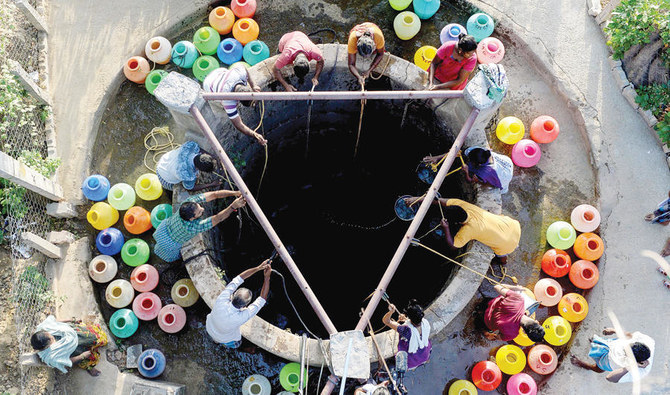NEW DELHI: Workers in the southern Indian city of Chennai are being told to work from home to save water as the country’s sixth-biggest city grapples with its worst-ever water crisis.
The city’s five major reservoirs are now all but empty following two failed monsoons, leaving more than 5 million people facing severe water restrictions.
Growing unrest over increasingly tight restrictions has led to protests and up to 500 arrests.
Chennai, known as the “Detroit of India,” is home to one-third of the country’s automobile industry, and is also an IT hub with more than 500 national and multinational firms.
The drought has forced leading multinational companies to issue open instructions to employees to cut back on water use. Some IT companies have also asked about a fifth of their employees to work from home in order to save water.
Italian auto giant Fiat Chrysler and multinational IT firms such as Tata Consultancy Services, Wipro and Cognizant have told employees to reduce water usage in canteens and restrooms.
The US-listed Cognizant Technology Solutions has instructed thousands of employees to reduce water use in its canteen and gym.
“We have also switched to biodegradable plates in our cafeterias, closed shower facilities in our gyms, and minimized washing of utensils by cafeteria vendors,” the firm said.
Vinod A, general secretary of the Forum for IT Employees, told Arab News that “some major IT companies have suggested employees work from home till the water crisis is solved.”
The Madras high court on Wednesday attacked the Tamil Nadu government for failing to take adequate measure to address Chennai’s water crisis.
In lower-middle-class areas of the city, the municipality is supplying water only twice a week.
BACKGROUND
The drought has forced leading multinational companies to issue open instructions to employees to cut back on water use.
Sunitha, a homemaker from Chitlapakam, said that “piped water now comes only twice a week and we cannot survive with that.”
The city requires 800 million liters of water every day, but Chennai Municipal Corporation is supplying less than 500 million liters.
The deficit is filled by private tankers, which charge more than 5,000 rupees ($71) for each supply — almost 10 times higher than recent prices.
Around 100 hostels housing young professionals and students from different parts of India have been forced to close in the past month.
Chennai is dependent on five lakes for its water supply, but all have gone dry as a result of two failed monsoons in the past two years.
Tamil Nadu Chief Minister Edappadi Palaniswami blamed the media for “blowing the situation out of proportion.”
“By October, when the rain starts, the problem will be over,” he said.
Professor S. Janakarajan, of the Madras Institute of Development Studies, said: “This is a man-made drought. The crisis is due to the lack of application of mind and negligence on the part of the government.
“Despite the failure of two consecutive monsoons, the government failed to devise a plan to find another source of water for this expanding city.
“The only immediate option for the government is to get ground water from wherever it is available,” he added.



























